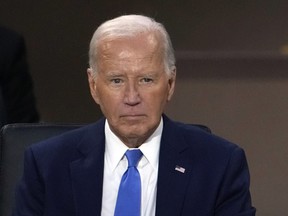(L-R) Mahmoud al-Aloul, Vice Chairman of the Central Committee of Palestinian organisation and political party Fatah, China’s Foreign Minister Wang Yi, and Mussa Abu Marzuk, senior member of the Palestinian Islamist movement Hamas, attend an event at the Diaoyutai State Guesthouse in Beijing on July 23, 2024. China’s Foreign Minister Wang Yi on July 23 hailed an agreement by 14 Palestinian factions to set up an “interim national reconciliation government” to govern Gaza after the war.
Pedro Pardo | Afp | Getty Images
Rival Palestinian factions Hamas and Fatah agreed to end their long-standing enmity and work to form a national unity government following talks held in China, Chinese state media reported Tuesday.
“On the morning of July 23, the closing ceremony of the reconciliation dialogue among Palestinian factions was held in Beijing. Representatives of Palestinian factions signed the ‘Beijing Declaration’ on ending division and strengthening Palestinian unity,” Chinese state media outlet CGTN wrote in a post on local social media platform Weibo, according to a translation provided by the website and vetted by CNBC.
The “inter-Palestinian reconciliation dialogue,” as it was described by the state outlet, had been underway in Beijing since Sunday.
This renewed attempt at unity marks a significant development, as Hamas and Fatah have been bitter enemies ever since the bloody 2006-2007 civil war in the Gaza Strip. Fatah, the Palestinian political party then governed both the West Bank and the Gaza enclave at the time, was violently kicked out of the latter territory, following Hamas’ election win in the Strip in 2006.
Hamas has governed the Gaza enclave since then and is currently embroiled in a brutal war with Israel. The offensive was triggered by the Hamas-led terror attacks of Oct. 7, which resulted in 1,200 deaths in Israel, with a further 253 people taken hostage by Hamas into the Gaza Strip, according to Israeli tallies. The Palestinian militant group is designated as a terrorist organization by the U.S. and U.K.
In the months since, Israel’s retaliatory assaults on the Gaza Strip have killed nearly 39,000 Palestinians there, according to health authorities in the enclave.
Hussam Badran, a senior Hamas official taking part in the talks, said in a statement cited by Reuters that “this declaration comes at an important time” amid Israel’s war in Gaza, and that the agreement was an “additional positive step towards achieving Palestinian national unity.”
Fatah, formally called the Palestinian National Liberation Movement, is led by Mahmoud Abbas, the President of the Palestinian Authority (PA). The PA, and Fatah as its dominant party, govern the West Bank — a Palestinian territory occupied by Israel.
China’s Foreign Minister Wang Yi (C) looks on during the signing of the “Beijing declaration” at the Diaoyutai State Guesthouse in Beijing on July 23, 2024. China’s Foreign Minister Wang Yi on July 23 hailed an agreement by 14 Palestinian factions to set up an “interim national reconciliation government” to govern Gaza after the war.
Pedro Pardo | Afp | Getty Images
Chinese state media hailed the agreement, saying it was signed by 14 Palestinian factions, while Chinese Foreign Minister Wang Yi called it a “historic moment for the cause of Palestine’s liberation.”
But this is far from the first time that Hamas and Fatah have signed reconciliation pacts, only to return to hostilities due to persisting disagreements.
“Before everyone gets excited and files a batch of stories about China as the Middle East’s new diplomatic power: a reminder that, since 2006, Hamas and Fatah also signed reconciliation agreements in Algiers, Cairo, Doha, Mecca and Sana’a, none of which actually reconciled them,” Gregg Carlstrom, author of the book “How Long Will Israel Survive? The Threat From Within,” wrote in a post on X.
While statements following the talks highlighted the signatories’ consensus on building an interim unity government that would be established with China’s support, long-time observers of the region noted that meetings and declarations will not determine success for the diplomatic efforts.
“Since 2007, there have been numerous rounds of negotiation and even provisional agreements aimed at reconciliation but they have all failed,” Taufiq Rahim, principal at 2040 Advisory and author of “Middle East in Crisis & Conflict: A Primer,” told CNBC.
“The devil is not in the details but the implementation,” he said. “Given the many uncertainties on the ground and the upcoming US elections the deal could be upended easily.”
China has increasingly moved to expand its role in international diplomacy, making world headlines in March of 2023 when it helped broker a historic normalization agreement between then-adversaries Iran and Saudi Arabia.





















Discussion about this post